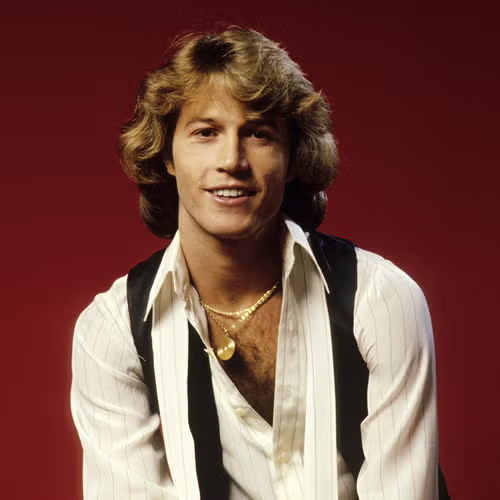
Table of Contents
Who Was Andy Gibb?
Andy Gibb, an English-born singer and songwriter, achieved brief yet notable success in the late 1970s as a solo artist. Though his brothers, Barry, Robin, and Maurice Gibb, formed the globally renowned group the Bee Gees, Andy carved out his own musical identity, gaining commercial success with his hit album Shadow Dancing. However, his promising career was marred by struggles with drug addiction, and by 1987, he faced financial ruin. Gibb passed away in 1988 at the age of 30, leaving behind a legacy of musical contributions and personal challenges.
Early Career
Born Andrew Roy Gibb on March 5, 1958, in Manchester, England, Andy was raised in a family deeply rooted in music. His father was a bandleader, and his mother was a singer, setting the stage for Andy’s own musical aspirations. At a young age, Gibb’s family relocated to Australia, where his brothers found early success on television and in music. The family returned to England, where the Bee Gees would go on to achieve international fame.
Growing up in the shadow of his older brothers, Andy was encouraged by Barry Gibb to pursue his passion for music. Barry gifted him his first guitar, and while he initially aspired to join the Bee Gees, Andy formed his own group, Melody Fayre, in the mid-1970s. Although the group disbanded, Andy continued to hone his musical craft, eventually attracting the attention of music mogul Robert Stigwood. His first hit, “Words and Music,” was a testament to his talent as both a singer and songwriter.
Top Solo Artist: Shadow Dancing
In 1976, at the age of 18, Andy moved to Miami to pursue a solo career. That same year, he married Kim Reeder, though the marriage would later end in divorce. Working alongside his brother Barry, Andy recorded his debut album Flowing Rivers (1977), which was an immediate success, featuring two number-one hits: “I Just Want to Be Your Everything” and “Love Is Thicker than Water.”
Andy’s popularity soared, particularly among teenagers, and his face became a regular feature in teen magazines. Building on this momentum, he released Shadow Dancing in 1978, which went multi-platinum, with the title track reaching number one on the pop charts. However, despite his professional success, Andy’s personal life was plagued by a growing battle with substance abuse.
Struggles with Addiction and Decline
As his career continued, Andy’s personal struggles deepened. While working on his final album After Dark (1980), his addiction intensified. His professional endeavors suffered as a result. He was fired from his role as co-host of the syndicated music show Solid Gold for failing to show up, and his Broadway stint in Joseph and the Amazing Technicolor Dreamcoat ended when he was dismissed for missing performances. His substance abuse also contributed to the breakdown of his relationship with actress Victoria Principal.
In the mid-1980s, after a family intervention, Andy sought treatment for his addiction at the Betty Ford Clinic. Although he made some public appearances following his recovery, he never regained the fame he once enjoyed. His financial situation deteriorated, and by 1987, he was forced to declare bankruptcy.
Death and Legacy
In early 1988, Andy signed a deal with Island Records, planning to record a new album in England. Unfortunately, he fell ill shortly after arriving. On March 10, 1988, Andy Gibb passed away from myocarditis, a heart condition, just days after celebrating his 30th birthday.
Though his life was cut short, Andy Gibb’s impact on pop music during the 1970s remains significant. He is survived by his daughter, Peta, from his marriage to Kim Reeder. His music continues to resonate with fans, and his story serves as both a testament to his musical talent and a tragic reminder of the destructive power of addiction.
